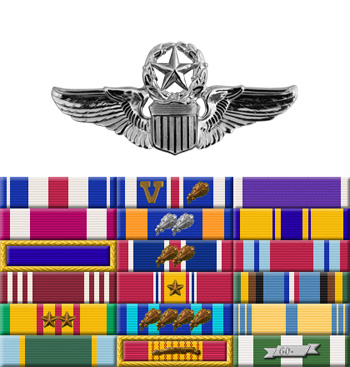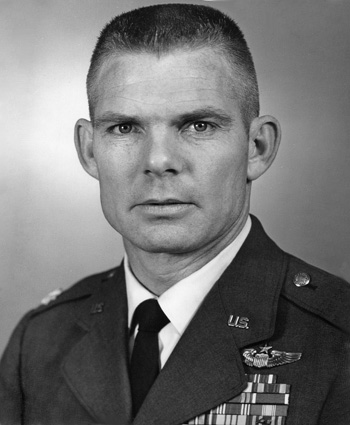
|
John Robert "Bob" Pardo |
 |
|||
| Rank, Service | ||||
Lieutenant Colonel O-5, U.S. Air Force |
||||
| Veteran of: | ||||
|
||||
| Tribute: | ||||
Bob Pardo was born on March 10, 1934, in Lacy-Lakeview, Texas. He enlisted in the Aviation Cadet Program of the U.S. Air Force on February 13, 1954, and was commissioned a 2nd Lt and awarded his pilot wings at Bryan AFB, Texas, on May 15, 1955. After completing gunnery school and F-84 Thunderjet Combat Crew Training, Lt Pardo served as an F-84 pilot at England AFB, Louisiana, from January to April 1956. His next assignment was as an F-84 and then F-100 Super Sabre pilot at RAF Woodbridge, England, from April 1956 to June 1959, followed by Weapons Controller School at Tyndall AFB, Florida, from June to September 1959. He then served as a Weapons Controller at MacDill AFB, Florida, from September 1959 to January 1960, and at Maxwell AFB, Alabama, from January 1960 to July 1961. Capt Pardo then served as an F-102 Delta Dagger pilot at Richards Gebaur AFB, Missouri, from July 1961 to December 1964, followed by service as an F-106 Delta Dart pilot at Loring AFB, Maine, from December 1964 to March 1966. Maj Pardo next upgraded to the F-4 Phantom II and served with the 433rd Tactical Fighter Squadron of the 8th Tactical Fighter Wing at Ubon Royal Thai AFB, Thailand, from November 1966 to September 1967, during which time he was credited with the destruction of 1 enemy aircraft in aerial combat. He then served as an F-4 pilot at RAF Bentwaters, England, from September 1967 to September 1969, followed by attending the Weapons Instructor School at Davis Monthan AFB, Arizona. Col Pardo's final assignment was as an instructor and flight commander at the Central Instructors School at Luke AFB, Arizona, from September 1970 until his retirement from the Air Force on March 1, 1974. Bob Pardo Flew West on December 5, 2023, and was buried at Houston National Cemetery in Houston, Texas. |
||||
|
||||

